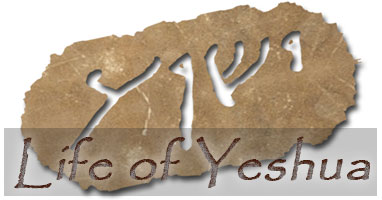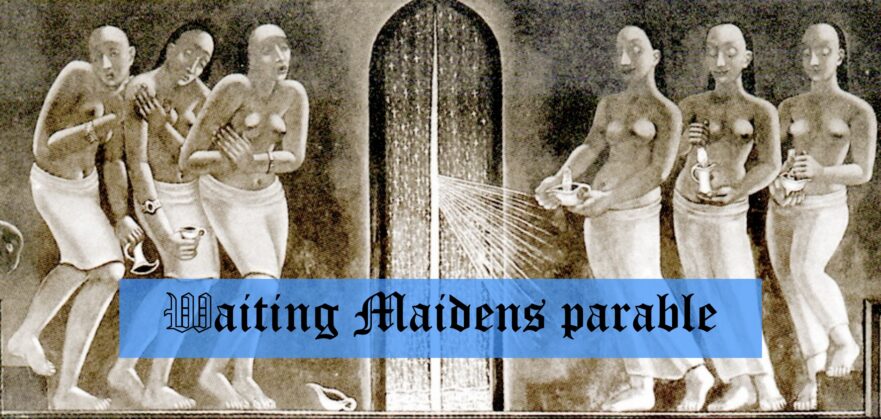How to cite this article:
Joshua N. Tilton and David N. Bivin, “Waiting Maidens Parable,” The Life of Yeshua: A Suggested Reconstruction (Jerusalem Perspective, 2024) [https://www.jerusalemperspective.com/29062/].
(Matt. 25:1-13)
(Huck 227; Aland 298; Crook 340)[1]
[וַיִּמְשׁוֹל לָהֶם מָשָׁל לֵאמֹר לְמָה הַדָּבָר דּוֹמֶה] לְעֶשֶׂר בְּתוּלוֹת שֶׁנָּטְלוּ לַפִּידִים וְיָצְאוּ לִקְרַאת הֶחָתָן חָמֵשׁ מֵהֶן הָיוּ טִפְּשׁוֹת וְחָמֵשׁ מֵהֶן הָיוּ פִּקְחוֹת הַטִּפְּשׁוֹת לֹא נָטְלוּ שֶׁמֶן וְהַפִּקְחוֹת נָטְלוּ שֶׁמֶן בַּפַּכִּים וְנִתְנַמְנְמוּ כּוּלָן וְיָשְׁנוּ כַּחֲצֹת הַלַּיְלָה וְהָיְתָה צְעָקָה הֲרֵי הֶחָתָן צְאוּ לִקְרָאתוֹ וְנִתְעוֹרְרוּ כָּל אוֹתָן הַבְּתוּלוֹת וְהֵטִיבוּ אֶת הַלַּפִּידִים וְאָמְרוּ הַטִּפְּשׁוֹת לַפִּקְחוֹת תְּנוּ לָנוּ מִשַּׁמְנְכֶן וְעָנוּ הַפִּקְחוֹת לוֹמַר שֶׁמָּא לֹא יִהְיֶה מַסְפִּיק לָנוּ וְלָכֶן אֲבָל לְכוּ לַמּוֹכְרִים וּקְחוּ וְהָלְכוּ וּבָא הֶחָתָן וְהַבְּתוּלוֹת הַפִּקְחוֹת נִכְנְסוּ עִמּוֹ [לְבֵית הַמִּשְׁתֶּה] וְנִנְעֶלֶת הַדֶּלֶת וּבָאוּ הַבְּתוּלוֹת הַטִּפְּשׁוֹת [וְהִתְחִילוּ לַעֲמוֹד בַּחוּץ וְלִדְפּוֹק עַל הַדֶּלֶת] לוֹמַר אֲדוֹנֵנוּ פְּתַח לָנוּ וְעָנָה וְאָמַר לֹא יָדַעְתִּי אֶתְכֶן
[And he told them a parable, saying, “To what may the matter be compared?] To ten maidens who took torches and went out to meet a groom. Five of them were foolish, and five of them were sensible. The foolish ones did not take oil, but the sensible ones took oil in cruses. They all became weary and fell asleep. At about midnight there was a shout: ‘The groom approaches! Go out to meet him!’ All those maidens awoke and trimmed their torches. The foolish ones said to the sensible ones, ‘Give us some of your oil.’ But the sensible ones answered, saying, ‘We fear there may not be enough for all of us. But go to the sellers and buy some.’ So off they went. The groom arrived and the sensible maidens entered with him [into the wedding hall], and the door was closed. Then the foolish maidens arrived [and they began to stand outside and to knock on the door], saying, ‘Our lord! Open up! Let us in!’ But in reply he answered, ‘I don’t know who you are!’”[2]
| Table of Contents |
|
3. Conjectured Stages of Transmission 5. Comment 8. Conclusion |
Reconstruction
To view the reconstructed text of Waiting Maidens parable click on the link below:
Paid Content
Premium Members and Friends of JP must be logged in to access this content: Login
If you do not have a paid subscription, please consider registering as a Premium Member starting at $10/month (paid monthly) or only $5/month (paid annually): Register
One Time Purchase Rather Than Membership
Rather than purchasing a membership subscription, you may purchase access to this single page for $1.99 USD. To purchase access we strongly encourage users to first register for a free account with JP (Register), which will make the process of accessing your purchase much simpler. Once you have registered you may login and purchase access to this page at this link:
Conclusion
Jesus addressed the Waiting Maidens parable to an audience that was acting foolishly. They balked at his demand for social justice that would come at the expense of their own wealth, power and privilege. By relating their situation to the sensible and foolish maidens, Jesus demonstrated the wisdom of acquiring repentance and good deeds now for the sake of participation in the final redemption, and portrayed the folly of inaction.
 Click here to return to The Life of Yeshua: A Suggested Reconstruction main page.
_______________________________________________________
Click here to return to The Life of Yeshua: A Suggested Reconstruction main page.
_______________________________________________________

- [1] For abbreviations and bibliographical references, see “Introduction to ‘The Life of Yeshua: A Suggested Reconstruction.’” ↩
- [2] This translation is a dynamic rendition of our reconstruction of the conjectured Hebrew source that stands behind the Greek of the Synoptic Gospels. It is not a translation of the Greek text of a canonical source. ↩

































































































